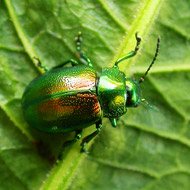
Reports highlight concerns for Britain's leaf beetles and stoneflies
Leaf beetles and stoneflies are on a 'red list' of species that are under threat of local extinction, according to reports published by Natural England in collaboration with Buglife.
The reports assess the conservation status of two groups of insects - leaf beetles and stoneflies - and classifies them as either 'vulnerable', 'endangered', or 'critically endangered'.
The review of leaf beetles discovered that out of the 283 species in the UK, three have become extinct in the last 100 years, and seven are classified as critically endangered and, as they have not been seen since 1950, are possibly already extinct.
The report also shows that 35 leaf beetles have been placed on the new red list and are considered as either 'critically endangered', endangered' or 'vulnerable', and under threat of becoming extinct in Britain in the near future.
Stoneflies fare slightly better. Out of 34 species found in the United Kingdom, one is now extinct, one is vulnerable to extinction, and another now joins the red list as a critically endangered species.
The reports are the latest in a series to be published under the Species Status project, which aims to help conservation organisations target future action. This is a new initiative that provides up-to-date assessments of the threat status of various species of insects using guidelines developed by the International Union for Conservation of Nature (IUCN).
The insects are highly sensitive to their environment - leaf beetles are often specific to certain plants in certain habitats, and stonefly larvae are particularly sensitive to organic pollution. Both are regarded as excellent indicators of health of the natural environment. Action supported by Natural England and the voluntary conservation sector is underway to try to prevent further declines in these species.
Natural England say that the reports provide vital new evidence that will help focus resources on managing habitats in the best way to improve the conservation status of these important insects.
Image (C) Geoff Oxford.



 The BSAVA has opened submissions for the BSAVA Clinical Research Abstracts 2026.
The BSAVA has opened submissions for the BSAVA Clinical Research Abstracts 2026.